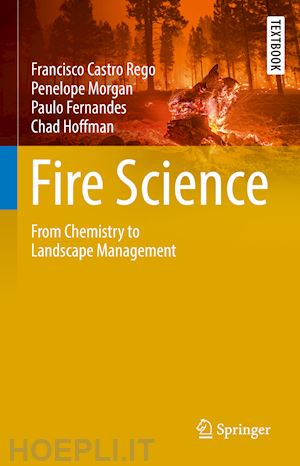

Questo prodotto usufruisce delle SPEDIZIONI GRATIS
selezionando l'opzione Corriere Veloce in fase di ordine.
Pagabile anche con Carta della cultura giovani e del merito, 18App Bonus Cultura e Carta del Docente
This textbook provides students and academics with a conceptual understanding of fire behavior and fire effects on people and ecosystems to support effective integrated fire management. Through case studies, interactive spreadsheets programmed with equations and graphics, and clear explanations, the book provides undergraduate, graduate, and professional readers with a straightforward learning path. The authors draw from years of experience in successfully teaching fundamental concepts and applications, synthesizing cutting-edge science, and applying lessons learned from fire practitioners.
We discuss fire as part of environmental and human health. Our process-based, comprehensive, and quantitative approach encompasses combustion and heat transfer, and fire effects on people, plants, soils, and animals in forest, grassland, and woodland ecosystems from around the Earth. Case studies and examples link fundamental concepts to local, landscape, and global fire implications, including social-ecological systems. Globally, fire science and integrated fire management have made major strides in the last few decades. Society faces numerous fire-related challenges, including the increasing occurrence of large fires that threaten people and property, smoke that poses a health hazard, and lengthening fire seasons worldwide. Fires are useful to suppress fires, conserve wildlife and habitat, enhance livestock grazing, manage fuels, and in ecological restoration. Understanding fire science is critical to forecasting the implication of global change for fires and their effects. Increasing the positive effects of fire (fuels reduction, enhanced habitat for many plants and animals, ecosystem services increased) while reducing the negative impacts of fires (loss of human lives, smoke and carbon emissions that threaten health, etc.) is part of making fires good servants rather than bad masters.
Dr. Francisco Castro Rego is Professor and Researcher at the Centro de Ecologia Aplicada Prof. Baeta Neves, Instituto Superior de Agronomia in Lisbon, Portugal. He was Director of the Portuguese Forest Services and led the Fire Paradox project funded by the European Union, with 36 partners from 16 countries, that advanced fire science and fire policy. Dr. Rego's research covers landscape and fire ecology, fire behavior, and fire management (http://comparatistas.academia.edu/FranciscoRego). Dr. Rego currently leads the Parliament's commission to investigate and recommend policy changes to address recent large fires in Portugal. He is the lead author of Applied Landscape Ecology, published in 2019 by Wiley.
Dr. Penelope Morgan is an Emeritus Professor in the Department of Forest, Rangeland, and Fire Sciences, University of Idaho, Moscow, Idaho, USA (https://www.uidaho.edu/cnr/faculty/morgan). Dr. Morgan's extensive teaching and research are in the ecological effects of wildland fires, with fire management implications. She has taught fire ecology, fire management, prescribed burning, and other topics to students who are now leading fire professionals. She is certified as Senior Fire Ecologist. She was recently recognized for Lifetime Achievement by the international Association for Fire Ecology.
Dr. Paulo Fernandes is Associate Professor in Departamento de Ciências Florestais e Arquitetura Paisagista and Researcher of Centro de Investigação e de Tecnologias Agro-Ambientais e Biológicas at Universidade de Trás-os-Montes e Alto Douro, Vila Real, Portugal. He teaches and studies wildland fire, with a particular interest in the links between fire behavior and fire effects and the corresponding management implications (https://scholar.google.com/citations?user=VEaRO9oAAAAJ&hl=pt-PT). Dr. Fernandes has been actively involved in prescribed fire technological development and outreach. He served on the board of the International Association of Wildland Fire and on the Portuguese Parliament commissions that investigated the 2017 disaster fires in Portugal and currently monitor fire management policies and fire activity in the country.
Dr. Chad Hoffman is an Associate Professor in the Department of Forest and Rangeland Stewardship and Co-director of the Western Forest Fire Research Center at Colorado State University, Fort Collins, Colorado, USA. Dr. Hoffman teaches and conducts research related to wildland fire and fuel dynamics. His research lab works on questions about how interactions among fire, fuels, topography, and the atmosphere influence fire behavior and effects across spatial and temporal scales using a combination of field and laboratory experiments and process-based models (https://scholar.google.com/citations?user=EEOXuBQAAAAJ&hl).











Il sito utilizza cookie ed altri strumenti di tracciamento che raccolgono informazioni dal dispositivo dell’utente. Oltre ai cookie tecnici ed analitici aggregati, strettamente necessari per il funzionamento di questo sito web, previo consenso dell’utente possono essere installati cookie di profilazione e marketing e cookie dei social media. Cliccando su “Accetto tutti i cookie” saranno attivate tutte le categorie di cookie. Per accettare solo deterninate categorie di cookie, cliccare invece su “Impostazioni cookie”. Chiudendo il banner o continuando a navigare saranno installati solo cookie tecnici. Per maggiori dettagli, consultare la Cookie Policy.